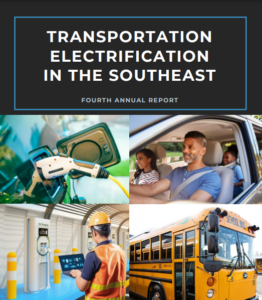Full Title: Transportation Electrification in the Southeast
Author(s): Tom Taylor, Matthew Vining, and Moe Khatib
Publisher(s): Southern Alliance for Clean Energy
Publication Date: September 30, 2023
Full Text: Download Resource
Description (excerpt):
Since September 2020, Atlas Public Policy (Atlas) has partnered with the Southern Alliance for Clean Energy (SACE) to publish the annual Transportation Electrification in the Southeast report. This report benchmarks progress on transportation electrification in six states in the Southeast: Alabama, Florida, Georgia, North Carolina, South Carolina, and Tennessee. This is the fourth annual report and provides an update on progress from July 2022 through June 2023. A transition to electric transportation is underway across the country and with good policy design and implementation, may deliver emissions reductions resulting in improved public health along with jobs and economic development opportunities. Public policy must ensure the electric grid continues to decarbonize to maximize the environmental benefits of EVs and that economic development is able to not only create new jobs but also ensure the existing workforce can transition. Analysis from SACE estimated that 23 percent of every dollar spent on gas and diesel remains in-region (Heather Pohnan, 2023). But when electricity is purchased to power vehicle travel instead, SACE estimated 71 percent of every dollar spent to charge EVs is retained, which can strengthen state economies and potentially save consumers money. There is also the potential for the amelioration of environmental injustices, but achieving those outcomes will require authentic engagement with impacted communities to understand and address their needs and priorities and monitoring of the distribution of benefits and investment impacts as the transition unfolds over the decade. The extent to which all of these benefits accrue to people across the Southeast depends on access to electric vehicles (EVs) and charging infrastructure in the region.
In the past two years, Congress passed the Bipartisan Infrastructure Law and the Inflation Reduction Act (IRA), unlocking substantial funding for transportation electrification via grants, loans, and consumer and manufacturer tax credits. At the time of publication, Southeast states tracked in this report should have submitted their second-year plans for the National Electric Vehicle Infrastructure (NEVI) Formula Program, which will invest $5 billion in public EV charging. States have also had the opportunity to compete for the first round of the $2.5 billion Charging and Fueling Infrastructure (CFI) Grant Program to support EV charging station deployment in communities outside the scope of the NEVI program.
